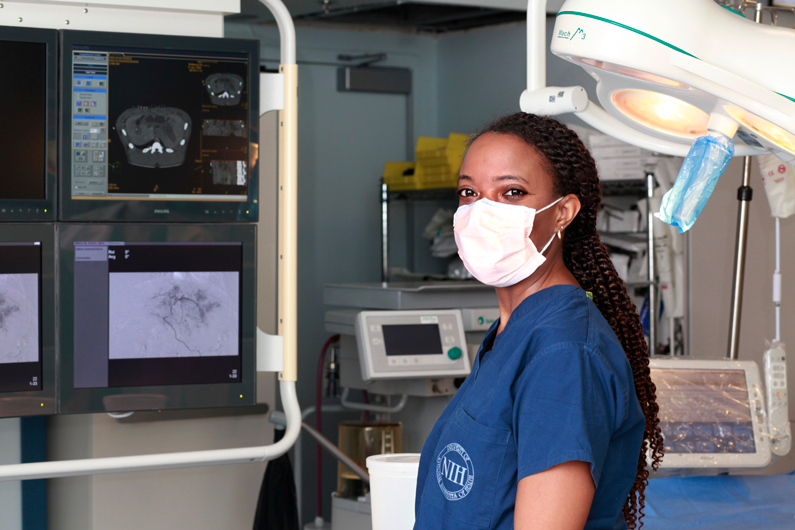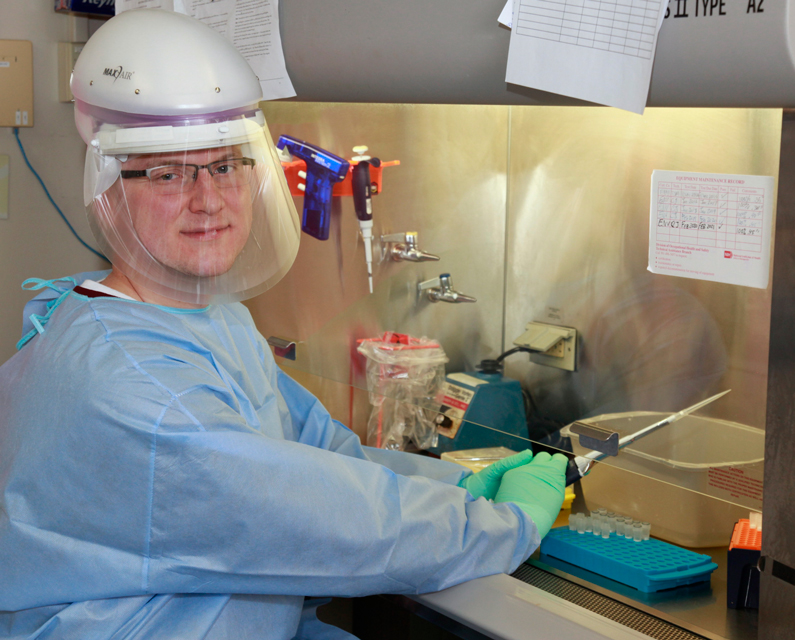Medical Research Program Thrives Through Pandemic
Students navigate challenges for a rewarding experience


This year the NIH Clinical Center has overcome many obstacles to continue providing outstanding patient care and world-class research. The Medical Research Scholars Program (MRSP), NIH's yearlong research immersion program, has been able to adapt and thrive despite the international health crisis.
The MRSP is a residential research program for medical, dental and veterinary students aiming to become clinician-scientists. But how does a residential program need to change during a pandemic? And why would a student take the risk to put medical school on hold, move to a new city and work in a hospital?
Sheridan Reed chose to participate in the MRSP between her third and fourth years at Michigan State University's College of Human Medicine, and it turns out that it was more rewarding than she had even imagined. Reed explained that her choice to take a year off of medical school was met with some gentle questioning from her peers. There is a momentum toward finishing a program that takes some discipline to fight against. "Taking the time for introspection is incredibly important in research," she said.
Reed explained that after being accepted, the first six weeks of the program were entirely online. Her school had already transitioned to a half remote, half clinical program - so she was somewhat accustomed to working from home but it was new to integrate into a team virtually. Everyone was welcoming and friendly but it was markedly different to meet new people over a video platform. People from her lab actively reached out to her to connect and get to know her, which made up for the challenges of meeting virtually.
Reed had graduated with a degree in biomedical engineering and had worked in medical research for three years before starting medical school. She wanted to join the MRSP in part because it is one year of dedicated focus - without having to worry about your clinical rotation or the next test, licensing or any of the myriad of other obligations of medical school.
"I wanted to explore research with the clinical context that I now have. Things look differently, you approach problems differently and you ask questions differently after having more medical knowledge/experience."
Reed was not sure exactly what specific type of research she wanted to do, and NIH has an enormously diverse body of work to consider. She did some self-reflection about the research that she could use more exposure to, as well as the work she had enjoyed in the past and began to miss some of the math and engineering she used to do. She emailed a number of labs and ended up joining the NIH Center for Interventional Oncology lab headed by Dr. Bradford Wood.
The initial settling in Bethesda from Grand Rapids, Mich., was a unique experience. She arrived in her group house about a week before her housemates, and she had yet to meet anyone from her lab in person. It was quiet. The self-motivation necessary in this context is also distinctly different from the traditional medical school experience. Reed explained that the goals in medical school are externally imposed and measurable - and that getting things done independently requires a different type of self-discipline.
In the program, Reed has worked on a number of projects that combine her engineering background with clinical research, including a device that is worn by asymptomatic COVID-positive patients to help protect healthcare workers and other patients from transmission.
She has considered changing her professional focus because of her fantastic MRSP experience. "I personally think the program is amazing ... The program truly made me realize how much I enjoy research and how innovative medicine can be. I am in an environment where my opinions and my questions and my ideas are treated with validity."
The Bradford Wood lab does a great deal of collaboration between departments - which Reed explains is not a given in your traditional hospital, where different departments typically keep to themselves. This sentiment was echoed by James Dickey - another MRSP scholar who is studying the transmission of infectious disease. Dickey felt the Clinical Center was less insular than in a typical university lab, leading to a sense of community. He described the atmosphere in the Clinical Center as unique, driven by people who are very excited and passionate about research.
Dickey is between his third and fourth years at the Medical College of Georgia, and is currently studying the spatial distribution of SARS-CoV-2 aerosols in patient rooms with the Emerging Pathogens Section headed by Dr. Daniel Chertow. He took a hiatus earlier in his academic career, staying to work at the evolutionary microbiology lab at Emory for an additional year before starting medical school.
Dickey grew a great deal as a researcher during this time period and loved having the time and focus to really dig into a research program. He decided to apply to the MRSP and is having an "absolutely positive experience, working with a fantastic group of smart, hardworking people."
When asked how they felt about the MRSP, Dickey responded, "What you gain at NIH, it's invaluable. Taking a year off, prolonging graduation, is minor compared to the skills and insight ... and the connections you can make through this program." Reed added, "I one hundred percent endorse the program."
- Daniel Silber